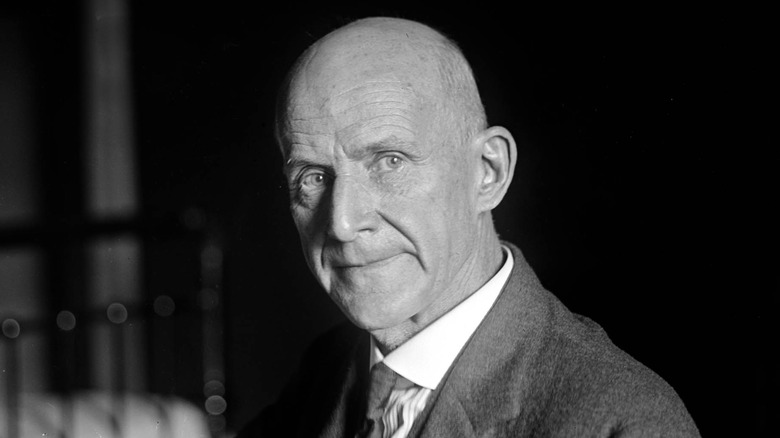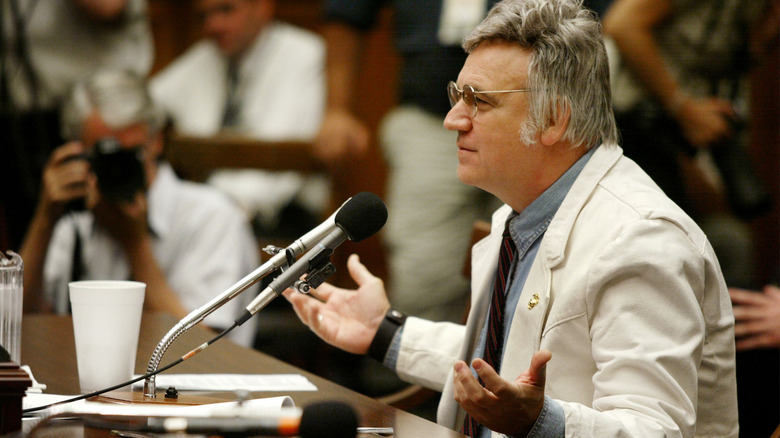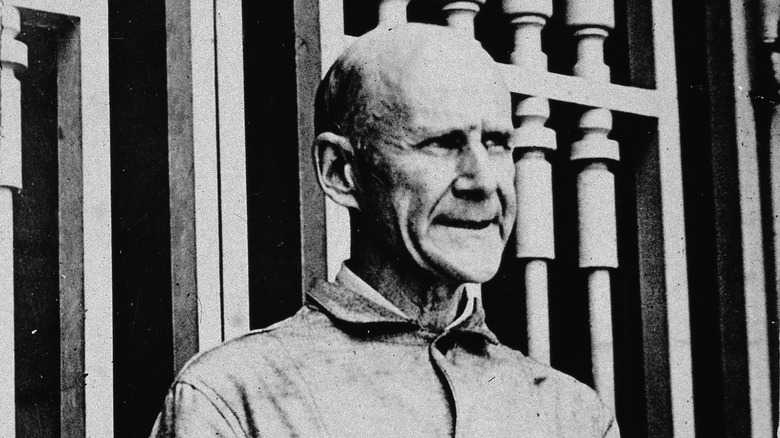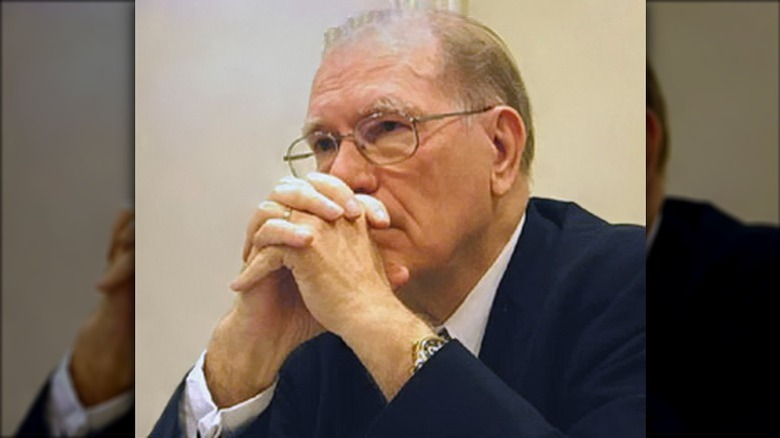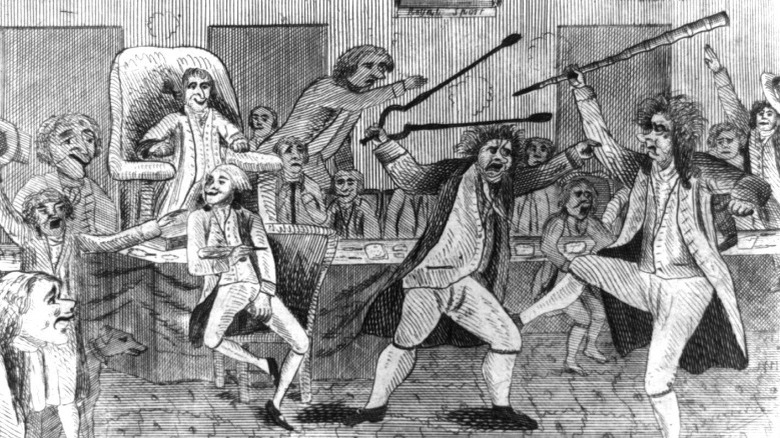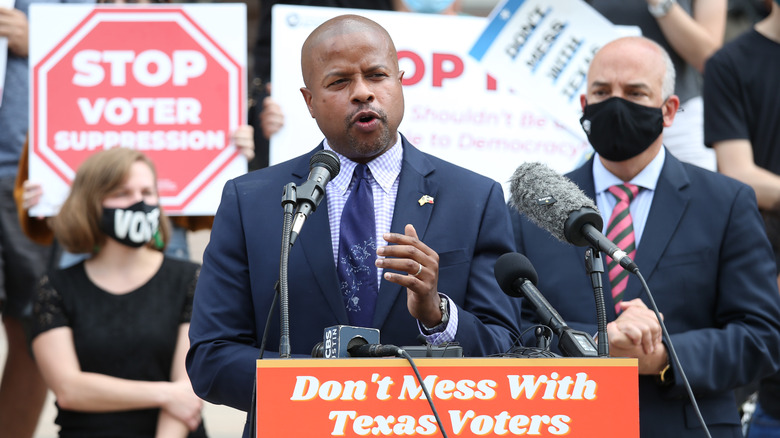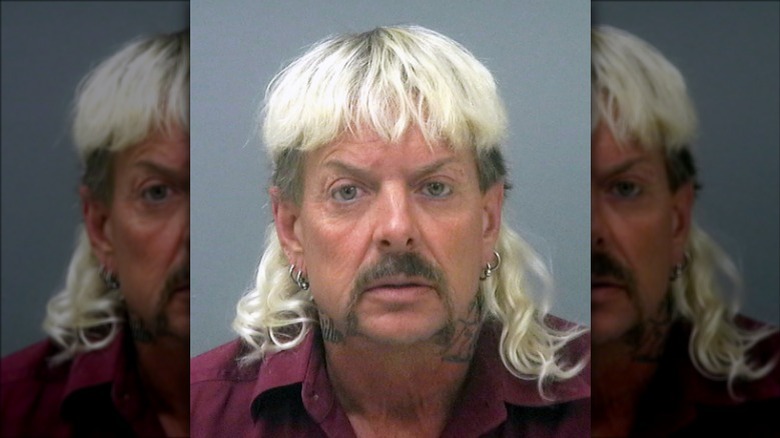Candidates Who Ran For Office From Prison
In functioning democracies, there should probably be some level of agreement on what makes a candidate ineligible to be elected to political office. However, in many cases, this is impossible. Even when a candidate is actually in prison, either charged with or convicted of a crime, plenty of people will still vote for them.
Sometimes, those who are locked up are political prisoners, who live in a country that is less free than it presents itself as, and have had trumped-up charges brought against them to keep them from being effective politically. In those cases, it's important they continue to be involved, throw their hat in the ring from behind bars, and prove they have the support of many in their nation. In plenty of other cases, however, the would-be politician is locked up for a bad crime they definitely committed. In those situations, their campaigns might be official but get little media attention, let alone many votes. Other times, they win their elections anyway, and constituents find themselves with an incarcerated elected representative.
No matter the reason they ended up there, politicians will find that running a campaign from behind bars presents unique challenges. Here are candidates who ran for office from prison.
Jim Trafficant
Jim Trafficant was a colorful character in the U.S. House of Representatives in the 1980s and '90s. The Democrat from Ohio took every chance to rail against what he saw as too much red tape and regulation from the federal government. In a 1998 speech reported on by The New York Times, he used some lofty comparisons to make his point: "Mr. Speaker, the Lord's Prayer is 66 words, the Gettysburg Address is 286 words, the Declaration of Independence is 1,322 words. U.S. regulations on the sale of cabbage — that is right, cabbage — is 27,000 words."
In 2002, the House became a little less quirky when Trafficant was thrown out in a nearly unanimous vote (only one member voted not to expel him). The list of charges against him takes up a not insignificant portion of his entry in the Biographical Dictionary of the United States Congress: "conspiracy to commit bribery, defraud the U.S., receipt of illegal gratuities, obstruction of justice, filing false tax returns, and racketeering." By that point, Trafficant had already been criminally charged and arrested.
Trafficant was found guilty and sentenced to eight years. However, that didn't stop him from running in the 2002 midterm election. When the Democratic party wouldn't have him, Trafficant ran instead as an independent candidate. Even from prison, he managed to get 15% of the vote. Trafficant was released in 2009 and though he ran again in 2010, he only did 1% better than he had from behind bars.
Eugene V. Debs
In 1920, a headline in the Great Falls Daily Tribune announced that the controversial Socialist party of the United States had chosen their nominee for president in that year's election: federal convict No. 2253. His name was Eugene V. Debs, and it was his fifth time running for the highest office. The fact he was in a jail cell on this occasion made no difference.
A firebrand who'd been a thorn in the side of the two-party system for years, Debs was finally sent to prison for a speech he gave after the United States entered World War I. As reported by The Washington Post, he encouraged a crowd in Canton, Ohio to reject the war, since it was always for the benefit of the rich and not the regular people: "The working class who freely shed their blood and furnish the corpses, have never yet had a voice in either declaring war or making peace. It is the ruling class that invariably does both." Debs was arrested for violating the Sedition Act of 1918, with federal prosecutor Edwin Wertz declaring, "No man, even though four times the candidate of his party for the highest office in the land, can violate the basic law of this land."
The Socialist party was unbothered, passing out campaign buttons reading "Prisoner 9653." (It's unclear why the Daily Tribune announced a different prison number.) He would go on to win 919,799 votes, or 3.4% of the total votes, in the election.
Lyndon LaRouche
Lyndon LaRouche had some non-mainstream beliefs, ranging from the very quirky to all-out fascist. He was against environmentalists, the 19th-century German composer Richard Wagner, the British Empire, rock music, the Federal Reserve System, Hitler, and the war in Iraq. On the other hand, he was a fan of Beethoven, farmers, Alexander Hamilton, Platonists, geometry, and making antisemitic and racist statements. This is barely scratching the surface of how weird, terrible, and controversial LaRouche was.
He spent decades on the fringes of politics, leading what The New York Times called "a cultlike political organization." LaRouche's strange mix of beliefs meant his politics over the years were equally all over the map, ranging from far left to far right, sometimes on the same subjects. He and his followers ran for offices as localized as school boards and as lofty as the president of the United States. In at least two cases, LaRouche-backed candidates did surprisingly well in state-level races by confusing voters when they touted their endorsement by the National Democratic Policy Committee, a front group that had no connection to the Democratic Party.
LaRouche ran for president eight times. While he never won or even came close, his campaigns did raise millions of dollars ... not always legally. In 1989, LaRouche went to prison for mail and tax fraud related to his campaigns; however, this didn't stop him from running for president in 1992 from behind bars. He served five years of his 15-year sentence and then ran again.
Matthew Lyon
One thing you can definitely say about Matthew Lyon's life: It wasn't boring. Born in Ireland, he immigrated to North America as an indentured servant in 1765. Lyon not only managed to continue his education after he arrived but also work additional jobs, which allowed him to buy his freedom after only three years. When the Revolution started, he joined the now-famous Green Mountain Boys but was dishonorably discharged before the war ended.
Once peace was declared, Lyon kept busy by helping found Vermont, several newspapers, and a few successful businesses. He also ran for office at both the state and national level and although he often lost, he won enough times that he is one of few people ever to represent more than one state in the U.S. House of Representatives: Vermont and Kentucky. In 1798, Rep. Roger Griswold infamously attacked Lyon in the Capitol (pictured) in retaliation for the latter spitting on Griswold on a previous occasion.
That same year, Lyon was convicted of treason under the newly-passed Alien and Sedition Act for vaguely insulting President John Adams in a letter written before the act was made law. Lyon was thrown into a small, freezing cell, and not allowed pen and paper until a friend complained. Lyon still ran in that year's election for the House of Representatives from his prison cell, and though it took two attempts before he received the necessary outright majority against four other candidates, he won the seat in a landslide.
Leyla Guven and Selahattin Demirtaş
The Kurdish minority in Turkey has faced an uphill battle for representation in the country's government. Not one but two of the leaders of the Peoples' Democratic Party ran for office from prison in 2018.
As Selahattin Demirtaş dramatically announced in an op-ed in The New York Times that year, "Turkey will vote in presidential and parliamentary elections on June 24. I am one of six candidates running for president. I am running from my prison cell." He had been detained on charges of "carrying out terrorist propaganda" since 2016, and at the time he wrote the op-ed, he had still not been to trial. Later that year, he was convicted and sentenced to almost five years. He did not win his bid for the presidency. The European Court of Human Rights has repeatedly ruled his detention is politically motivated and demanded his release, but as of 2023, Turkey has refused.
Similarly, Leyla Guven was arrested in January 2018 and was still in prison when she ran for and won a seat in Parliament that June. In November of that year, she began a hunger strike, coming close to death. Everyone from members of the European Parliament to actress Maxine Peake to Angela Davis demanded Guven's release. She would eventually be sentenced to 22 years, during which time she suffered further, with her jailers punishing her for singing in Kurdish by revoking her various methods of communicating with the outside world for a month.
Jeremy Brown
As far as campaign announcements go, it was more dramatic than most. From a phone call placed from behind bars, a voice said, "Today, January 6, 2022, from the maximum-security section of the Pinellas County jail, I, Jeremy Brown, announce my candidacy for Florida state House of Representatives." While Brown's answers to Ballotpedia's Candidate Connection survey in 2022 explain he sees himself as a "Political Prisoner for exposing the illegal actions and corruption of the FBI," the Justice Department says he was one of the Oath Keepers who breached the Capitol to stop the certification of electoral votes for Joe Biden on January 6, 2020.
Despite, or indeed, because of this, his candidacy received more attention than one might expect for a state House race. Brown received endorsements from Donald Trump's advisor Roger Stone and the owner of Joe's NY Pizza. Brown said he believed in term limits and state's rights, while he was against Critical Race Theory, "gender-confusing tactics," defunding the police, and government overreach. Brown did end up being the Republican candidate in the general election, but lost to his Democratic opponent, getting only 30.9% of votes.
No matter how you feel about his politics or his actions on January 6, one of his answers on the Ballotpedia survey does give hope Americans can still find common ground. To the question "What was the last song that got stuck in your head?," Brown replied, "C'mon, Man! Isn't it the same for ALL of us? 'Baby Shark.'"
Ron Reynolds
In 2015, Texas State Rep. Ron Reynolds was convicted of "barratry," a.k.a. "ambulance chasing," for using shady tactics to get legal clients. This had nothing to do with his political career, and, since the conviction was only a misdemeanor, he wasn't required to give up his seat in the House. Despite his conviction, he won reelection in 2016 and the Democratic primary in 2018.
But after exhausting all his appeals, Reynolds had no choice but to serve his one-year sentence. The timing worked out so that the candidate would actually be in prison during the 2018 midterm election. And if he won, it was almost certain Reynolds would still be there when the Texas legislative session began, meaning he would need to be an effective elected representative for many people while locked up.
His campaign promised voters this would not be an issue. "Rep. Reynolds has full confidence that his experienced staff will be able to handle any immediate needs of his constituents, during his 4-6 month absence," according to a statement from Reynolds' campaign. In fact, he'd even sacrificed some of his freedom so that his jail term would be over sooner and he could get back to governing (assuming he would be credited a large chunk of time for good behavior), saying he "voluntarily revoked his appeal bond so that he could be prepared to start the 86th Legislative Session on time." Reynolds won the seat, getting over 61% of the vote in the general election.
Jordi Sànchez
Not every area of Spain wants to be part of that country. One of those places is Catalonia, the area surrounding Barcelona in the northeast corner of Spain. While a 2021 poll found only about 45% of residents there supported full independence and a break from Spain (versus about 49% who were against it), in 2019, another poll found a full 70% of Catalonians at least want to be able to hold a referendum on the question.
It was just such a referendum that seemed to result in the arrest and imprisonment of Jordi Sànchez, a leader of the independence movement. In 2017, Catalonia held its own makeshift referendum that was not legal or binding per the federal government. Shortly thereafter, Jordi Sànchez and fellow Catalonian Jordi Cuixart were arrested on charges of sedition. Technically, the charges were related to protests before the referendum, but the timing was suspect, to say the least.
Sànchez's arrest and denial of bail led to widespread protests, and even Amnesty Internation released a statement calling it "excessive." He was eventually convicted and sentenced to nine years. While in prison, he not only ran for a seat in the Spanish parliament and won, but was nominated for president. He was allowed out of jail to attend one session of parliament, but the resulting circus led to his and three others' suspension from the governing body. Sànchez and Cuixart were released in 2021 after serving one-third of their sentences.
Joe Exotic
Before "Tiger King" brought him worldwide fame, Joe Exotic was just a regular guy with a zoo full of tigers who decided to run for president in 2016. Arguably the biggest attention his campaign received was when, during an episode of "Last Week Tonight" on third parties, host John Oliver showed a clip of Joe explaining why he'd make a good president (including being broke and refusing to wear a suit).
As you may remember, Joe Exotic did not become president in 2016. However, that did not deter him from throwing his hat in the ring again. He announced on Twitter in March 2023, "It's official! I am now a candidate for President of the United States in 2024," alongside an image of the necessary paperwork he'd filed. One major thing had changed since his 2016 run, which he addressed: "Yes, I know I am in Federal Prison and you might think this is a joke but it's not. It is my Constitutional right to do this even from here," he wrote. He was not wrong that he could legally run, but that might not be the only hurdle to his actually winning.
As for his pitch to voters? Well, he wants them to "move past" his crimes since ... most of them eat meat every day. It's unclear how eating animals would make the electorate lose the moral high ground to a man who was convicted of, among other things, hiring a hitman to kill a rival.
Joel Caston
Most people on this list were politicians before they went to prison and simply tried to continue their careers from behind bars. It is much less common for someone convicted of a crime to turn to politics for the first time in jail. This makes Joel Caston and his political rivals particularly impressive. In 2021, DCist reported five prisoners at the District of Columbia Jail were running for the Ward 7 Advisory Neighborhood Commission. This came with unique complications, as Julie Johnson of Neighbors for Justice pointed out: "[W]hen you are on lockdown, you can't go talk to people about your candidacy and ask people to sign your form directly."
Overcoming these challenges, Caston was the victorious candidate, getting 33% of the 142 votes cast, DCist reported. Caston said, "It's a good feeling, but also a sense of responsibility. ... [M]y purpose is to let people know that while you're inside, you can think about political science, you can engage in civic matters, you can do these things as incarcerated persons."
As a politician representing his constituents, the jail was committed to making sure Caston had the tools he needed. Gottlieb Simon, director of the Office of Advisory Neighborhood Commissions, said Caston would "have 24-7 internet access, and they will be providing him with a tablet." As well as being involved virtually, "He'll also be able to host some meetings at the facility with fellow commissioners, with constituents, though DOC may have some screening requirements."
Azam Tariq
When a reporter for The New York Times Magazine wanted to interview Maulana Azam Tariq in 2003, the Pakistani Sunni cleric told him directions wouldn't be necessary since "Anyone will know how to find me." The reporter discovered this was true, which was not necessarily a good thing. As Tariq explained in the interview, "I've had 11 attempts on my life, with knives, guns, bombs, even rocket launchers." Only two days after making that statement, Tariq was assassinated, shot dozens of times while in a car, despite being in a safe area and surrounded by three bodyguards.
Tariq was the leader of Sipah-e-Sahaba, an extremist organization that was banned by Pakistan from 2001 until 2018, and which had connections to al Qaeda. In 2001, Tariq was jailed for over a year, and although he was never actually charged with a crime, it was widely believed he and other members of Sipah-e-Sahaba were behind hundreds of murders of rival Shi'ite Muslims. He would be released in 2002, only 11 months before he was killed.
While he was behind bars, Tariq ran for a seat in Pakistan's National Assembly. He won and was released from prison only a few weeks later. When he took his seat in the National Assembly, Tariq supported President Pervez Musharraf, the man who had put Tariq in prison in the first place, which led to rumors that he had cut a deal with his former enemy in exchange for his release. Tariq denied this, however.
